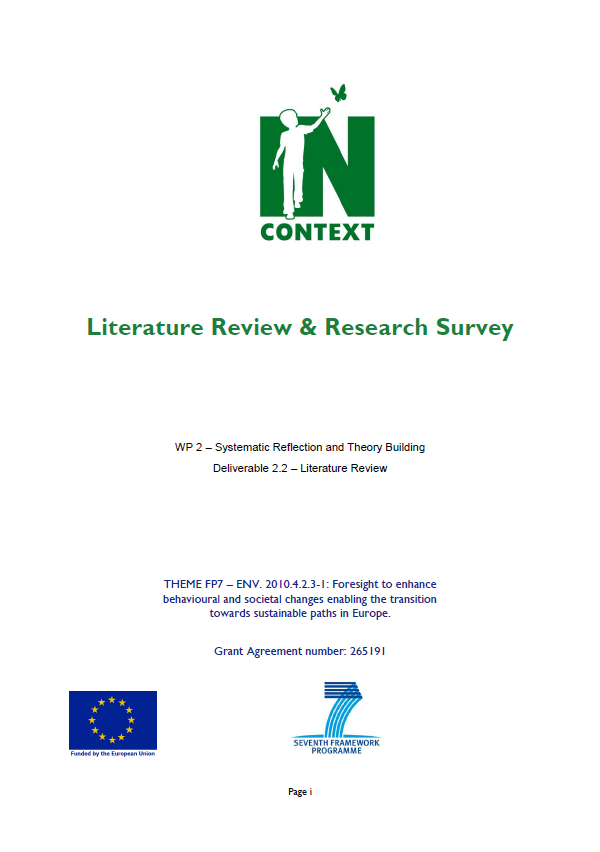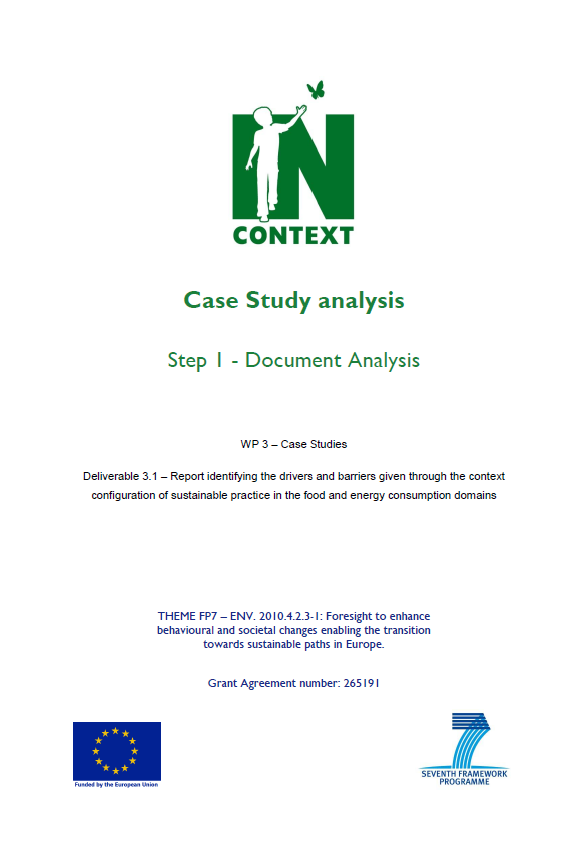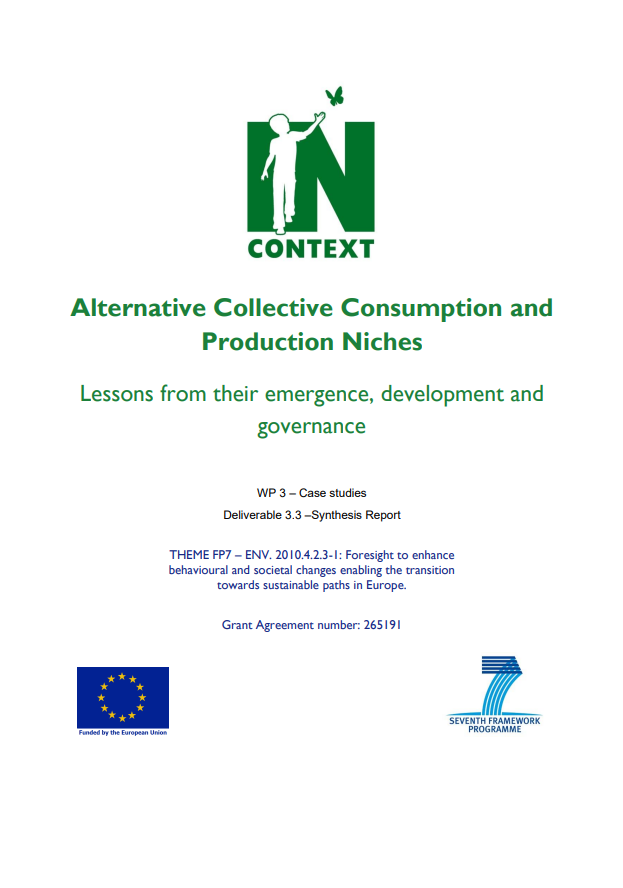Individuals in Context: Supportive Environments for Sustainable Living (InContext)
- Project
- Research Program
- Duration
-
-
The three-year research project "InContext" identified framework conditions enabling societal transition towards an ecologically sound, economically successful and culturally diverse future. Action at local and individual levels is vital to bring the concept of sustainable development to life. However, policies aimed at initiating such local and individual transitions towards sustainability can often not achieve the desired change. Thus, the EU research project InContext has set out to investigate the conditions for creating sustainability transitions at the local and individual levels.
The InContext team initiated three local transition arenas and observed four bottom-up initiatives for alternative living in local communities across Europe. It combined action orientated interventions with conceptual thinking about sustainable behaviour. The insights gained on change towards sustainability have been published in several scientific deliverables. Furthermore, they have been condensed in several briefs. One policy brief sheds light on how the EU can support local transition processes. The policy brief "Out of the town hall" explores new ways of engagement between local governments and bottom-up initiatives, including a presentation of the "community arena" process that was developed in InContext. One research brief focuses on the role of action research for sustainability transitions.
The ten key messages below summarise lessons learnt in a nutshell. They should not be read as a scientific synthesis of results, nor are they a cookbook for policy-makers with easy-to-follow recipes. Rather, the InContext team propose them as discussion points.
How to create space for change? Key insights for policy-makers and grassroots activists
Change is happening anyway. Policy-makers cannot engineer it, but they can foster it.
Diverse grassroots initiatives that emerge at the local level contribute to a transformation of our society towards sustainability. They are a valid and rich part of the response to our pressing societal challenges. At the same time, the uniqueness of each project and process and the diversity of the settings in which they develop, cautions against any attempt to define a blueprint for planting bottom-up initiatives. Rather, policy-makers at all levels of government should try to build on ongoing dynamics and create a favourable environment for long-term change. Transition Management is a powerful approach to shape ongoing change, but it is one approach, not a solution to everything.
Further reading: The role of transformative communities in addressing societal challenges.
Starting with something that is concrete and relevant is a good way of engaging people.
Applying transition management at the local level has taught us that concrete issues at the place in question are the best entry point for mobilising people. Facilitators have to be sensitive to the ongoing local dynamics, understand what touches people and build on this. These entry points can be social issues, questions of individual or collective well-being, or they can relate to symbolic institutions or places in the community.
Further reading: The Community Arena. Methodological Guidelines
Shared visions can drive change – even in diverse groups.
Working on a common vision for a desirable future can unleash the transformative power of individuals, groups and communities. Visions can help guide transitions. When people define concrete small steps based on a vision of greater change, it can encourage them to become and remain active. If carefully moderated, the process of developing a vision can also become a powerful tool for unifying even extremely diverse groups, because discussion is turned away from daily battles to reveal a shared purpose for the long term.
Further reading: Pilot project reports. Year 1, Year 2, Year 3
Sustainable development may not always be a helpful term, but opening the debate to the long-term and faraway places is.
In the local change processes started within InContext, sustainable development was sometimes felt to be too abstract and too worn-out a term for sparking constructive debate. However, the issues addressed in the concept do matter to people. When introducing the long term into the debate and evoking linkages to communities across the globe, sustainability issues are vividly discussed. Change towards a more sustainable future becomes a means for people to feel well in their communities instead of being an end in itself. That said, it is too early to judge how the processes will impact sustainability in the communities over the long haul. Adequate methods for evaluation remain to be developed.
Further reading: Synthesis Report on Pilot Projects
The inner context and external structures need to change in tandem.
Our research is built on the hypothesis that long-lasting change in individual and collective behaviour will only come about if both external structures, such as norms, policies and infrastructure, as well as the inner context, consisting of values, motivation and beliefs, change in tandem. It has been more difficult than expected to address the values, beliefs and motivations of individuals. But judging from self-reporting of participants involved, our research does nonetheless confirm that individual and society-based factors interact when new forms of behaviour emerge. The interplay needs to be mutually reinforcing. Having a new perspective or a new motivation is critical for achieving changes in one’s surrounding. In turn, the ability to achieve even small changes in the external environment becomes the source of empowerment for individuals and groups, enticing them to continue the process.
Further reading: Foundations for a Common Approach
Change has a physical place.
Place-based approaches make sustainable development more tangible to people. InContext shows that implementing transition management at the local level is a promising approach for sparking transformation, even though it is not always easy to draw the borders of the local community in question. Moreover, in all observed processes, the shaping of a concrete physical space – be it a community centre or organic farmland – has appeared vital for change to actually take place. The physical space shaped by the group becomes a symbol of what is possible.
Further reading: Empirical Case Study Report
Change needs space for experimenting and learning.
Finding new ways of organising how we consume, produce and govern is a joint searching process. The cases we observed and the processes we initiated within InContext clearly indicated that one of the most appropriate ways for governments to support these learning processes is to open space for them. Space in this sense means physical room, time for exchange, flexibility in applying rules and standard procedures, and sometimes also mindful non-interference (not to be confused with ignorance).
Further reading: Case Study Synthesis Report
Making change happen asks for renegotiation of roles and identities.
The alternative models of consuming and producing we observed in our research are very diverse. They share, however, the common feature of redefining what a consumer or a producer is and does. This redefinition does not happen at once, but takes place in a continuous, collective negotiation process. A similar insight emerged in the local community arenas: Lasting change will depend on citizens and policy-makers rethinking their respective roles in driving decision-making in their communities. Citizens and policy-makers meeting as people (rather than as representatives of institutions) is a potent means to start this reflection process.
Further reading: Policy Brief. Going out of the town hall
In French: Policy Brief. Sortir de la Mairie
In Dutch: Policy Brief. Kom eens het gemeentehuis uit!
In German: Policy Brief. Raus aus dem Rathaus
In Polish: Policy Brief. Wychodząc poza urząd miasta korzyści oraz jak można je osiągnąć
Change processes profit from able facilitators.
Regardless of the type of initiative – be it a village starting its own energy cooperative or a participation process organised by a local government—open-ended processes aiming for transformation at the local level profit from skilled facilitators. To allow for learning and empowerment, participants first need to develop trust. For this to happen, activists, administrators or – as in our case – action researchers need to be dedicated, delicate and reflective moderators, sensitive to the local dynamics and the participants’ values, needs, and emotions. Facilitation methods also matter greatly and have to be carefully chosen in each stage of the process.
Further reading: Action Research for Sustainability. Reflections on Transition in Practice
Action-orientated research needs tailored funding.
InContext shows that to address the societal challenges that Europe faces, it is worthwhile to explore new types of action-orientated research together with citizens. This type of research requires additional skills, different evaluation criteria and longer funding periods than more traditional research. Thus, to show its full potential, action-orientated research needs openness and support from both governments and research bodies. The European Union’s Horizon2020 programme provides an invaluable opportunity to bring this type of research forward - also jointly with Structural and Cohesion Funds.
Further reading: Policy Brief. How the EU Can Support Local Transition Processes










